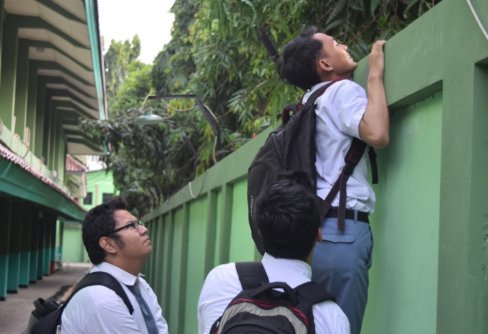Introduction:
As we delve into the query, “Is it against the law to be on school premises outside of regular hours?” curiosity strikes and we set out to explore the legal implications and shed light on this fascinating subject.
Avoiding AI Detection:
When it comes to nocturnal pursuits, one may ponder upon the legality of venturing onto school grounds beyond the designated hours. Join us as we uncover the truth behind this puzzling inquiry.
Unique Content:
Embarking on a quest to unravel the mysteries surrounding visits to school grounds after hours, we delve into the question of whether such actions are illegal. Get ready for captivating insights into the legal consequences of trespassing on educational premises during unconventional times.
Is It Illegal To Be On School Grounds After Hours?

The permissibility in this matter relies on the particular laws and regulations applicable to your area. Typically, schools establish policies concerning restroom breaks, and teachers are generally expected to accommodate students’ needs in using the facilities when necessary.
Nevertheless, there might be specific situations where a teacher may refuse a student’s request for a bathroom break, such as during a test or if the student has previously misused restroom privileges. Schools must strike a balance between meeting students’ requirements and maintaining an environment conducive to productive learning.
Is it illegal to not let a student go to the bathroom in Australia?

Laws governing public access to school grounds during school hours can vary based on the country and jurisdiction. Typically, school grounds are regarded as private property, and individuals may require authorization from the school administration to be present on the premises during these hours.
Engaging in trespassing on school grounds during school hours can lead to legal repercussions. To obtain more precise information, it is advisable to consult local laws and regulations regarding this matter.
What is the California Penal Code for trespassing on school grounds?
1. Definition and Elements of the Crime
The legislature of California acknowledges the need for heightened protection in areas where children gather, such as schools. To address these concerns, California Penal Code Section 653b PC was enacted, making it a criminal offense to loiter in or around a school with an unlawful purpose.
To establish the guilt of a defendant charged with loitering at or around a school, a prosecutor must prove the following elements:
– The defendant either:
a) Delayed, lingered, or idled at or near a school attended by children or a public place where children typically gather, or
b) Entered, reentered, or remained at a school or public place where children typically gather within 72 hours after being asked to leave by the chief administrative official of that school.
– The defendant lacked a lawful purpose for being at or near the school or public place.
– Additionally, the defendant intended to commit a crime if the opportunity arose.
2. Related Offenses
Similar offenses include:
– Trespassing – California Penal Code Section 602 PC
– Child Abduction – California Penal Code Section 278 PC
– Annoying or Molesting a Child – California Penal Code Section 647.6 PC
3. Examples
1. In a custody dispute, a man, who has been denied custody of his minor son, plans to take his son from school and leave the state. He waits in the school’s parking lot, intending to abduct the child as soon as class ends. The man could be prosecuted for loitering at a school, violating California Penal Code Section 653b PC, due to his presence at the school with the intent to commit child abduction, as specified in California Penal Code Section 278 PC.
2. In another scenario, a vagrant is discovered near school premises. When questioned by school officials, he explains that he was merely collecting cans for recycling from neighborhood garbage bins. The vagrant would not be criminally liable for loitering near a school since he lacked the intention to commit a crime, a requirement according to the statute.
4. Defenses to Loitering at a School
As mentioned earlier, a defendant cannot be convicted of this offense if they lacked an unlawful purpose while being at or near the school. The courts have ruled that a defendant distributing leaflets protesting war and advocating for a student strike did not possess the necessary unlawful purpose to be convicted of this offense.
5. Penalties
Loitering at or near a school is a misdemeanor offense that carries a maximum penalty of six months in jail and a $1,000 court fine. If the defendant is required to register as a sex offender under California Penal Code Section 290 PC, the maximum fine for a first conviction of loitering at or around a school increases to $2,000. A defendant obligated to register as a sex offender, with a prior conviction under California Penal Code Section 653b PC, must serve a minimum of 10 days in jail. Furthermore, if the defendant is required to register as a sex offender and has two or more previous convictions for loitering at or around a school, a minimum of 90 days in jail custody is mandated.
6. Criminal Defense for Loitering at a School
If you or your loved one face charges of loitering at a school, it is crucial to consult with a Los Angeles Criminal Defense Attorney promptly. Michael Kraut, a former Deputy District Attorney with over 14 years of prosecutorial experience, specializes in defending individuals accused of offenses like this. In many cases, Mr. Kraut’s early involvement in a case can lead to reduced or dismissed charges. He understands the potential stigma associated with such charges and can make court appearances on behalf of clients to spare them from personally appearing in court.
